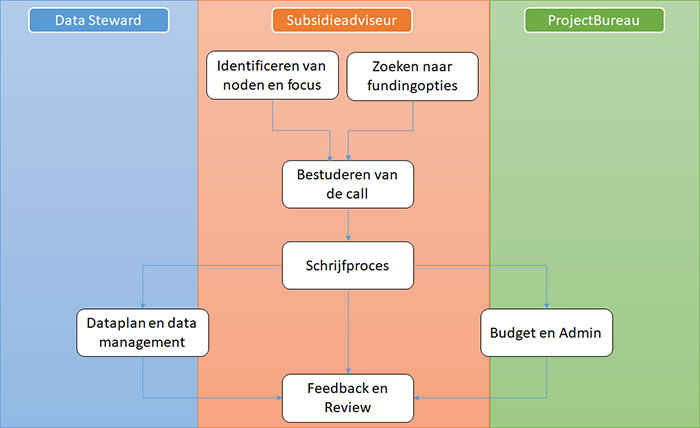This framework consists of three main pillars: the data steward, the grant advisor, end the project office.

The Grant Advisor
Identification of needs and focus
In principle, the grant advisor is involved from the first conception of he proposal, clarifying the funding need of the researcher. What is the precise purpose of the researcher? Examples are many: funding the organisation of a research conference, accommodating a research visit at a reputable foreign institute, initiating new collaborations with other researchers, collection of data or gaining access to existing data sets, buying out extra research time, setting up one’s own research group, etc. Naturally, the funding instruments a researcher would look for depend on his or her funding needs.
In a first conversation with the grant advisor, a further important topic is the focus of the research proposal.
- Problem Statement: What is the problem the proposed research aims to tackle? What makes this problem urgent? Why is it important? What are the societal consequences if this problem remains unaddressed?
- State of the art: Which contributions have already been made towards a solution to this problem? How far along are we in solving it conclusively? What will the proposed research add to the existing knowledge? Why has the problem not been solved yet?
- Curriculum Vitae: Why is the researcher in question ideally placed to address this problem? What makes him or her uniquely fit to extend the existing knowledge further than has been done to date?
- Impact: What is the impact of this research? Who are the stakeholders? How do they benefit from the results of this research? Which strategies will be deployed to ensure that the results of this research do infact reach the stakeholders?
Gaining clarity on these matters from the very start facilitates the writing process and often leads to more competitive proposals.
Search for funding opportunities
Researchers who want to submit a funding proposal rely on the available funding sources. The grant advisor can assist in this effort. The researcher further has access to the tool RESEARCHconnect which is a database in which one can look for funding opportunities by means of a simple search. To find European calls and corresponding consortia researchers may consult the website EUCalls. They are further referred to relevant newsletters: NWO, NRO, KNAW, ERC, Neth-ER, Interreg, Rijksoverheid, NUFFIC, AWTI, ICDE, EADTU, etc.
Studying the call
Often a funding call states quite explicitly what the associated funding body is looking for, and what it expects from a succesful proposal. Researchers are therefore encouraged to thoroughly read through the call document and additionally, to discuss it with the grant advisor. While reading researchers do well to keep in mind the focus of the proposal and how it fits with the requirements of the call.
Tip:
The European Commission is working on an Annotated Model Agreement (draft: July 2021). This is a manual that explains the EU model agreements (General MGA, Lump Sum MGA, Unit MGA, Operating grants MGA and FPA) for a series of 2021-2027 funding programmes to researchers who have requested or accepted EU funding. Note: At this point, only a draft version is available.
The writing process
The researcher starts the writing of the proposal. At this point it is important to keep the grant advisor in the loop by having drafts read and commented on. The grant advisor is often not a specialist in the topic of the proposal, but can nevertheless comment on the impression the proposal makes, whether it is in line with the requirements of the call, and how it will be read by the evaluating panel.
Once the foundations of the proposal have been established, it is time to include the data steward and the project office.
The Project Office
The project office takes care of all the financial, administrative and legal matters associated with a funding proposal. This means the office is responsible for the calculation and approval of budgets, that it routes the proposal to the Board of Directors for approval and for signing of requested documents, e.g. embedding guarantees letters of intent, mandate letters, consortium or partner agreements, etc. To this end the office employs a checklist which involves a short summary of the project, an argument why the project is of value to the OU, duration of the project, costs, revenues and possibly match funding. If a proposal is successful, then in this instance too, the financial and administrative matters are handled by the project office.
The Data Steward
Funding bodies often request a detailed data management plan that complements the funding proposal. For an overview of the support the data steward can offer in this respect of the proposal, see the page research data management.
Contact
For more information, contact the grant advisor of the Open Universiteit, Bram Driesen, the data steward of the Open Universiteit, or the project office.
